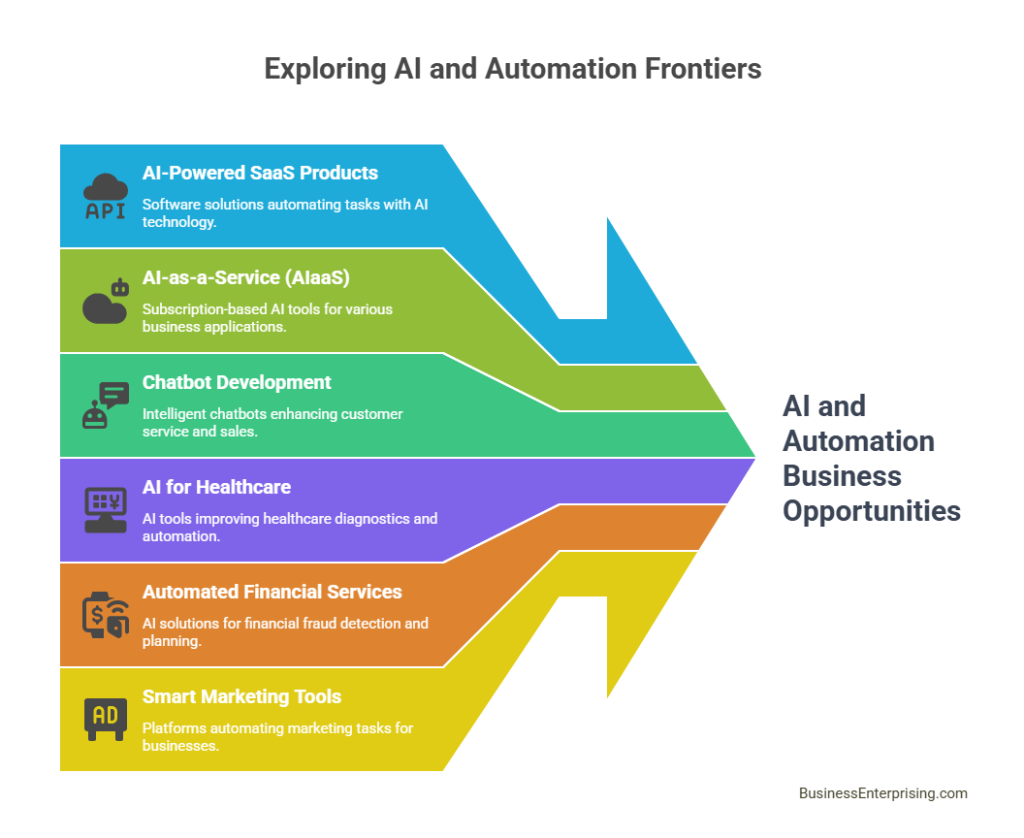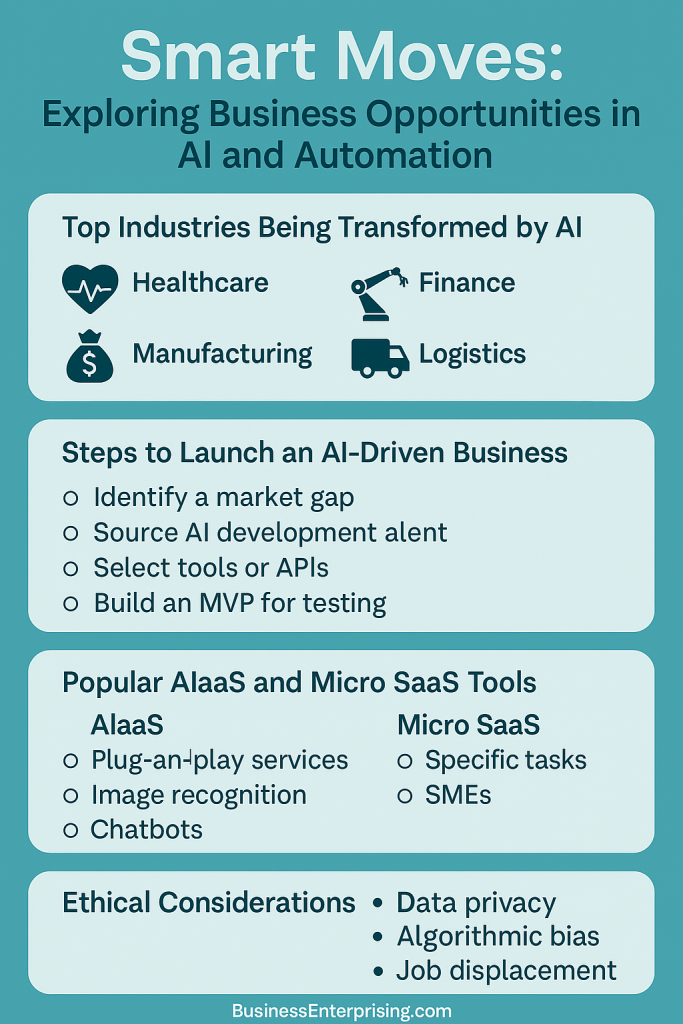
Additionally, businesses in every industry are testing automation to improve speed and reduce costs. You may already use AI tools without realizing it. From chatbots to smart reports, these systems are becoming standard. Therefore, understanding how they work gives you an edge in your market.
However, jumping in without a plan can lead to wasted time and money. You’ll need to start small and stay focused. Find a clear business problem and match it with a simple solution. That approach gives you real feedback and helps you improve fast.
More companies are also building AI tools for specific tasks. These Micro SaaS products solve one issue well and are easier to manage. Additionally, many of them run with limited support or staff. That makes them appealing for solo founders or small teams.
If you’ve thought about starting something in tech, now may be the time. The tools are more available than ever. Markets are open to smart solutions that save time or cut costs. You can start lean, test fast, and grow only when it makes sense.
This shift is already reshaping how products are built and sold. By learning the basics and moving quickly, you can find your place in this growing space.
The Current Landscape of AI and Automation
AI and automation are moving fast. Businesses across all industries are adopting these technologies to improve efficiency and lower costs. You’ve likely noticed automated customer support, smart inventory systems, and AI tools shaping how work gets done. These changes aren’t just for large companies. Small and mid-sized businesses are also tapping into AI-driven solutions.
Additionally, many companies now use AI to analyze data and make decisions faster. You can see this in sectors like healthcare, finance, logistics, and e-commerce. For example, AI helps doctors detect health issues early. Banks use it to detect fraud and offer personalized financial advice. Retailers rely on automation for smarter supply chain management.
More than ever, businesses are investing in tools that automate routine tasks. As a result, they can focus more on growth and innovation. Forecasts predict that the global AI market will exceed $400 billion within the next few years. That means there’s real momentum and growing demand for smart automation tools.
Therefore, now is a good time to consider the business opportunities in AI and automation. Companies want tools that are easy to implement and affordable. You don’t need to be a tech expert to take part in this trend. Many off-the-shelf platforms allow you to build or sell AI solutions with low upfront costs.
However, competition is rising. As more players enter the market, your offering needs to solve real problems. Think about how AI can help your customers save time or money. If it does, you’ve got something worth building. Still, success depends on staying updated and moving quickly.
Keep learning, testing, and listening to your market. That’s how you stay relevant in a space that’s always changing.
Emerging Sectors Ripe for Disruption
Several industries are seeing major change due to AI and automation. These shifts are creating real opportunities for businesses of all sizes. Healthcare, for example, now uses AI to support diagnostics and manage patient data more efficiently. You’ll see tools that help doctors review scans or predict treatment outcomes. This means better care delivered faster.
Finance is changing fast too. Many banks use automation to process loans, detect fraud, and deliver customer support through chatbots. Additionally, AI helps financial planners analyze large datasets to make smarter decisions. If you’re in that space, there’s a growing demand for tools that improve accuracy and cut costs.
Manufacturing also benefits from AI-driven systems. Machines now monitor production lines and predict maintenance needs. As a result, companies reduce downtime and save money. Therefore, factories are shifting from traditional methods to smarter, automated systems. If your business serves this industry, automation tools could be a smart direction.
Logistics is another area with growing potential. AI helps companies optimize routes, track inventory, and forecast delivery times. With rising consumer expectations, businesses are eager for faster, more reliable shipping. You can build or sell tools that solve those problems with little overhead.
Additionally, marketing teams rely on AI more than ever. From targeting ads to writing copy, automation is shaping how campaigns are built. If your clients need better leads or performance, AI-based marketing tools are worth exploring.
All of these examples show the growing business opportunities in AI and automation. You don’t need to target every industry. However, picking the right one can make your offer more valuable and easier to scale.
Startup and Investment Opportunities
Startup founders and investors are focusing more on AI and automation. These technologies continue to shift how businesses operate and grow. If you’re looking to start something new, now may be the time to act. The tools and platforms available make entry easier than it was just a few years ago.
Additionally, SaaS businesses powered by AI are gaining attention. These products often solve specific problems, like automating reports or managing customer data. You can build tools that help smaller companies save time and cut costs. Many startups are doing well by targeting a single issue and solving it with automation.
Therefore, if you’re an investor, early-stage AI startups may be worth a look. Some focus on research and development, while others aim at real-world applications. These ventures often need seed funding to refine their models or scale their products. With the right team and support, returns can be strong.
However, not every idea will stick. You’ll need to assess the problem being solved and the size of the potential market. Many investors focus on teams that understand both tech and the target industry. That mix often leads to faster traction and better execution.
There are growing business opportunities in AI and automation across industries. Your role could be as a founder, builder, or backer. What matters most is finding a gap worth filling. Additionally, stay flexible. Markets shift quickly, and AI evolves even faster.
If you’re thinking long term, AI offers more than hype. It offers a chance to build or support businesses with lasting value.
AI-as-a-Service (AIaaS) and Micro SaaS Models
AI-as-a-Service is changing how software gets built and sold. You can now access machine learning, voice tools, or image analysis with simple APIs. These services let you build without hiring a full team of AI experts. That means more small businesses can enter the tech space with fewer barriers.
Additionally, Micro SaaS models are becoming more popular. These are small software products that solve very specific problems. For example, you could create a tool that uses AI to write better email subject lines. Or one that helps e-commerce stores tag photos automatically. The product stays simple, but the value is clear.
Therefore, you can build a Micro SaaS around a single AI feature. AI platforms make it easy to add functions like chatbot support or document scanning. You don’t need to build the tech from scratch. Instead, you plug into existing services and focus on user needs.
However, competition is growing. You’ll need a focused idea and a clear benefit. Start with one feature, and expand only if users ask. Many Micro SaaS founders keep things small by design. That way, they reduce costs and maintain control.
The growth of these models adds to the broader business opportunities in AI and automation. You can build tools for freelancers, small businesses, or niche industries. Additionally, you can test quickly and scale only what works. That makes Micro SaaS a smart option for first-time founders.
If you’re looking for a low-risk way to enter the AI space, this approach could work well. It’s lean, focused, and fast.
Challenges and Ethical Considerations
AI and automation come with real benefits, but also real concerns. You’ll need to think about risks before launching anything new. One of the biggest issues is data privacy. AI systems often rely on large amounts of personal or sensitive data. Therefore, how you collect and store that data matters.
Additionally, algorithmic bias remains a problem. If your training data is flawed, your results will be too. This can create unfair outcomes. For example, hiring tools might favor certain groups while excluding others. You must test your models carefully and remain transparent with your users.
Job displacement is another concern. Automation can replace repetitive roles, especially in manufacturing or support services. However, it also creates new jobs in tech and operations. If you’re building solutions, consider how they affect your clients’ teams. Some companies now use AI to assist workers, not replace them entirely.
Therefore, think about how your product fits into a larger system. You may need to balance efficiency with responsibility. Some businesses also face backlash if users don’t understand how the AI works. Clear communication can help avoid confusion or mistrust.
These challenges don’t cancel out the business opportunities in AI and automation. They just mean you’ll need a thoughtful approach. Additionally, companies that act responsibly often build stronger brands. People value fairness and security, especially with new technologies.
If you’re entering this space, ask hard questions early. That way, you can build smarter, safer products from the start.
Steps to Launch an AI-Driven Business
Starting an AI-driven business doesn’t need to be complex. You can begin by identifying a clear problem that needs solving. Look for daily tasks or bottlenecks in industries you understand. These pain points often lead to great product ideas.
Additionally, narrow your focus before you build anything. You want a problem that’s common but not yet solved well. Once you have that, your next step is to explore existing AI tools and APIs. These can help you create a working solution faster without heavy development costs.
Therefore, selecting the right platform matters. Some tools specialize in tasks like image recognition, data sorting, or chat automation. Match the tool to your problem. If you need help building the system, look for freelance AI developers or small technical teams. You can find solid talent even with a limited budget.
After that, build a minimum viable product, or MVP. Your goal isn’t perfection—it’s function. You want to test the concept quickly and get real feedback. Keep your features limited so users stay focused. Fix what breaks and improve what gets used the most.
However, don’t overbuild. Many startups waste time on features no one wants. Focus on results and listen to your users. Use their feedback to improve version by version.
These steps can help you explore business opportunities in AI and automation with lower risk. Additionally, by starting lean, you’ll stay flexible as your idea evolves.
If you’re ready to act, pick one step and start now. Most success stories begin with one small, well-timed decision.
Conclusion
AI and automation are no longer just future concepts. They’re active parts of business strategy across many industries. You can take part now. The tools are available, and the demand continues to grow. Additionally, customers want faster, smarter, and more affordable solutions. If you meet that need, you create real value.
However, you’ll need to stay focused. AI can distract you with endless features and technical options. Stick to solving a clear problem. Then refine your solution based on real user input. Most businesses don’t need complex systems. They need reliable results delivered simply.
Therefore, spend time learning the space before you invest deeply. Test small ideas and gather feedback. That approach helps you avoid waste and move faster. If you’re unsure where to start, pick one process and ask how AI might improve it.
Additionally, keep ethics and user trust in mind. How you use data and explain automation matters. People want to understand the tools they rely on. If your product is fair and clear, it earns more trust over time.
The business opportunities in AI and automation are real and growing. You don’t need a big budget to get involved. What matters more is speed, focus, and a clear understanding of user needs.
If you stay consistent and keep learning, you’ll have a better shot at building something that lasts. Start simple, listen carefully, and adjust when needed. That approach works better than trying to predict everything upfront.




